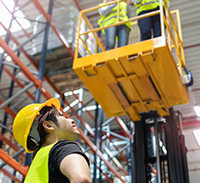 Skilling for Recovery - Working in high and confined spaces, white card and CPR
Skilling for Recovery - Working in high and confined spaces, white card and CPR

This course is offered under the NSW Government's Skilling for Recovery initiative. This initiative offers fee-free and low-fee training options to eligible students to boost skills development across full and part qualifications. The aim of this program is to support Australia's economic recovery through the development of workforce skills that businesses need to sustain our economic development.
CPCCWHS1001 Prepare to work safely in the construction industry
This unit of competency specifies the mandatory work health and safety training required prior to undertaking construction work. The unit requires the person to demonstrate personal awareness and knowledge of health and safety legislative requirements in order to work safely and prevent injury or harm to self and others. It covers identifying and orally reporting common construction hazards, understanding basic risk control measures, and identifying procedures for responding to potential incidents and emergencies. It also covers correctly selecting and fitting common personal protective equipment (PPE) used for construction work.
- The White Card does not expire but if a worker has not worked in the construction industry for 2 or more years, they must re-train.
- More information about this qualification and how it applies to you, your business or your staff can be found at SafeWork NSW.
RIIWHS202E Enter and work in confined spaces
This unit describes the skills and knowledge required to enter and work in confined spaces in the resources and infrastructure industries. It applies to those working in operational roles. They generally work under supervision to undertake a prescribed range of functions involving known routines and procedures and take responsibility for the quality of work outcomes. It covers planning and preparing for work in the confined space, working in the confined space, exiting the confined space and cleaning up the confined space.
RIIWHS204E Work safely at heights
This unit describes the skills and knowledge required to work safely at heights in the resources and infrastructure industries. It applies to those working in operational roles. They generally work under supervision to undertake a prescribed range of functions involving known routines and procedures and take responsibility for the quality of work outcomes. It covers identifying work requirements, procedures and instructions, accessing and installing equipment, performing work at heights, and cleaning up the work area.
HLTAID001 Provide cardiopulmonary resuscitation
This unit describes the skills and knowledge required to perform cardiopulmonary resuscitation (CPR) in line with the Australian Resuscitation Council (ARC) Guidelines. This unit applies to all workers who may be required to provide CPR, in a range of situations, including community and workplace settings.
This is a one-day course based on pre-reading and completion of a workbook before attendance at the course. The workbook will be available when you enrol or can be downloaded and printed at home. Download the Workbook.
This workbook contains the theory students need to know before attending face-to-face training. The face-to-face training will focus on the practical skills and assessment. Students are required to read the workbook and attempt the revision questions. The completed workbook should be handed to the course Trainer/Assessor at the commencement of class.
Pre-requisites for participation in Skilling for Recovery - Working in high and confined spaces, white card and CPR
- Age minimum: 16 years of age;
- High risk courses: Students need to wear long pants, long shirt and enclosed shoes to the course;
- CPR: As part of the assessment in class, students will need to kneel on the floor and undertake two demonstrations of CPR (each a 4 minute duration) in order for the Trainer/Assessor to sign off competency for CPR. You will need to bring a clean towel to kneel upon for the floor work.
Evidence of Identity is required for enrolment in this course - see guidelines below
- On enrolment, students are required to show campus staff original Evidence of Identity (EOI) documents that add up to at least 100 points.
- On the day of training, students are required to show the RTO delegate (trainer) the same (original) Evidence of Identity (EOI) documents that add up to at least 100 points.
- Within these documents the applicant must be able to show a photo, date of birth, signature and current residential address.
Some documents you can use to provide your Evidence of Identity (EOI) can include:
- Australian birth certificate;
- Australian drivers licence;
- Medicare card;
- ATM card;
- utilities bill.
This training is delivered by Community College Northern Inland Inc. RTO 90027. On successful completion of the training program, the nationally recognised Statements of Attainment CPCCWHS1001 Prepare to work safely in the construction industry, RIIWHS202E Enter and work in confined spaces, RIIWHS204E Work safely at heights and HLTAID001 Provide cardiopulmonary resuscitation will be issued to students assessed as competent by Community College Northern Inland.
- Prepare to work safely in the construction industry (CPCCWHS1001)
- Enter and work in confined spaces (RIIWHS202E)
- Work safely at heights (RIIWHS204E)
- Provide cardiopulmonary resuscitation (HLTAID001)
This course has no current classes. Please the waiting list.
